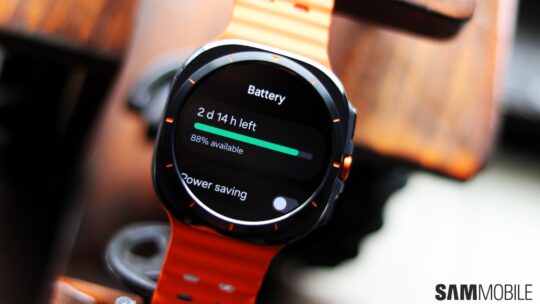The Galaxy Watch Ultra is the beginning of something impressive. The smartwatch has an excellent set of features, fast performance, and a bold design language.
I have been using it for the past couple of months, and contrary to my expectations, there is one aspect with which I was most and least impressed at the same time: battery.
Galaxy Watch Ultra's battery life is impressive but charging speed isn't
Samsung has equipped the Galaxy Watch Ultra with a big battery (590mAh, like the Galaxy Watch 5 Pro) and a 3nm chip (Exynos W1000). While I expected more, I am still extremely impressed with its battery life.
I have been getting close to three days of battery life on a single charge. Even with the Always On Display (AOD) mode turned on, the watch can go without needing a charge for nearly two days. And that is with all the health-related features turned on and set to the maximum settings.
Moreover, unlike my Galaxy Watch 4, which I have been using for over two years, the battery life is consistent. I haven't experienced any sudden drop in battery levels.
However, another aspect of the Galaxy Watch Ultra's battery is the biggest pain point, at least in my experience: its battery needs a long, long time to get fully charged. It takes more than a couple of hours to go from zero (or 5%) to full, and while I don't expect Samsung to make charging speed fast enough to get a full charge 30-45 minutes, the 2+ hour charge time is disappointing for a watch with the Ultra tag.
Galaxy Watch Ultra charges slower than even the Apple Watch Ultra
Samsung has long been criticized for not upgrading the charging speeds on Galaxy devices. And instead of addressing those complaints, it is going in the opposite direction. Not offering upgrades with new devices is acceptable, but taking steps backwards is inexcusable, especially when taking into account the higher price tags that are attached to Samsung's phones and wearables this year.
The Galaxy Watch Ultra isn't the only 2024 product from Samsung that charges slow, and it feels like there is a trend developing. The Galaxy Z Fold 6 takes longer to charge at 25W compared to its predecessor, while the Galaxy Tab S10 Ultra charges extremely slow at 45W with third-party cables that charge other Samsung phones and tablets at 45W just fine.
As far as the Galaxy Watch Ultra is concerned, what makes it worse is that it needs Samsung's proprietary charger. That's because of the way the back of the watch is designed.
That shape allows for more accurate health and fitness tracking, but makes it incompatible with chargers from other manufacturers. It is also the reason why the Watch Ultra doesn't support Wireless PowerShare, meaning you cannot wirelessly charge it using your flagship Galaxy phone.
That's not a problem with smartwatches from competing brands. They also charge much faster. For example, Oppo smartwatches take just one hour to go from 0-100%. Even the Apple Watch Ultra 2, with a battery capacity comparable to that of Samsung's first Ultra smartwatch, charges up to 80% in 60 minutes, and hopefully Samsung will try to match that with the Galaxy Watch Ultra's sequel.
The post Galaxy Watch Ultra’s most impressive aspect is also its biggest pain point appeared first on SamMobile.



Post a Comment